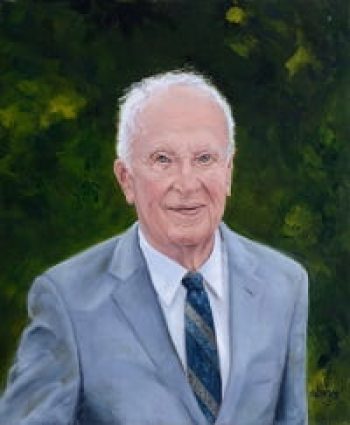Dr. Phil Williams
- Canadian Agricultural Hall of Fame
- Inductees
- Dr. Phil Williams

- Inducted: 2021
- Residing Province: Manitoba
Dr. Phil Williams
- (1933
- -
- )
A pioneering cereal chemist, Dr. Phil Williams developed innovative technology that revolutionized the Canadian cereal industry’s ability to accurately measure and compensate Canadian producers for wheat protein. An internationally recognized authority on near-infrared spectroscopy (NIRS) and transmittance (NIT) technology, Phil created numerous technologies that continue to be used around the world throughout his more than 40-year career in public service.
Born in Wales, Phil began his Canadian career, and lifelong contributions to the agriculture industry, with the Canadian Grain Commission in Winnipeg, Manitoba in 1965. As the chemist in charge of protein testing, he was the first in the world to use NIRS technology to test wheat for protein and moisture content industrially—a move that led to the wheat segregation program used in Canada.
His NIRS technology resulted in protein testing of Canadian Western Red Spring Wheat (CWRS) at port terminals during train-unload—a system used in Canada since 1975.
This process was later extended to country elevators, simplifying the segregation of wheat by protein content, and ensuring producers were paid for the protein of the grain they delivered. As the world authority on NIRS and NIT, Phil worked with others to translate this practical technology to a diversity of applications, leaving a lasting impact on Canadian and international agriculture.
The ultimate adoption of NIRS for protein testing of Canada’s multi-billion-dollar CWRS wheat industry brought international credibility to NIRS, and to Phil’s work—a testament to his foresight, persistence and determination. A special honour of his life’s work came with the naming of AC Phil—a namesake wheat variety recognizing his contributions.
Phil’s international influence included an invitation by the International Development Research Centre to recommend tests to assist maize and wheat breeders in Mexico, on behalf of the World Health Organization, and his long-standing participation in the International Centre for Agricultural Research in Dry Areas at Aleppo, Syria.
When Phil retired from the Canadian Grain Commission, he adapted his NIRS technology to the hog industry to analyze liquid manure nutrients as they were pumped out of hog barn lagoons. This technology eliminated the need for sampling and ensured excessive nutrients were not applied to areas of a field.
A role model, mentor and dedicated scientist, Phil has garnered well-earned recognition with awards from various organizations and countries including a Fellow of the International Council for Near-infrared Spectroscopy and an award from the American Association of Cereal Chemists International that is now the Phil Williams Award in Applied Research.
Known for his warmth and willingness to share knowledge, Dr. Phil Williams transformed wheat production in Canada for the benefit of the entire value chain with his NIRS technology.
Pionnier de la chimie céréalière, Phil Williams a mis au point une technologie innovatrice qui a révolutionné la capacité de l’industrie céréalière canadienne à mesurer avec précision la teneur en protéines du blé et à rémunérer les producteurs en conséquence. Reconnu mondialement pour son expertise dans les domaines de la spectroscopie dans le proche infrarouge (SPIR) et de la spectroscopie de transmission dans le proche infrarouge (STPIR), il a créé de nombreuses techniques qui, après une carrière de plus de 40 ans dans la fonction publique, continuent d’être utilisées un peu partout dans le monde.
Né au pays de Galles, M. Williams a entamé sa carrière canadienne au sein de la Commission canadienne des grains à Winnipeg, au Manitoba, en 1965. En sa qualité de chimiste responsable du dosage des protéines, il a été le premier au monde à utiliser la SPIR pour mesurer la teneur en protéines et le degré d’humidité du blé à l’échelle industrielle, chose qui a mené au programme canadien de classement du blé en fonction de sa teneur en protéines.
Sa technologie SPIR a donné lieu au dosage des protéines du blé roux de printemps de l’Ouest canadien (CWRS) dans les terminaux portuaires durant le déchargement des trains, système utilisé au Canada depuis 1975. Ce procédé a plus tard été étendu aux élévateurs, implifiant le classement du blé en fonction de sa teneur en protéines et assurant aux producteurs d’être payés selon la teneur en protéines du grain livré. Son statut d’autorité mondiale en matière de SPIR et de STPIR l’a amené à travailler avec d’autres intervenants afin que ces technologies pratiques puissent être adaptées à diverses applications, ce qui a eu un impact durable sur l’agriculture canadienne et internationale.
L’adoption ultime de la SPIR pour le dosage des protéines dans l’industrie canadienne du CWRS, d’une valeur de plusieurs milliards de dollars, a assuré la crédibilité internationale de la SPIR, et de M Williams, témoignant ainsi de sa perspicacité, de sa persévérance et de sa détermination. Son travail a d’ailleurs reçu un honneur tout spécial à la suite de la désignation d’une variété de blé en son nom, AC Phil.
L’influence internationale de M. Williams comporte une invitation du Centre de recherches pour le développement international à recommander des analyses pour aider les producteurs de maïs et de blé du Mexique, au nom de l’Organisation mondiale de la santé, ainsi qu’une participation de longue date au Centre international de recherches agricoles dans les régions sèches, à Alep, en Syrie.
Lorsqu’il s’est retiré de la Commission canadienne des grains, il a adapté sa technologie SPIR à l’industrie porcine afin d’analyser les nutriments du purin lors du pompage des fosses à purin des porcheries. Cette technologie a permis d’éliminer le besoin d’échantillonnage et d’assurer que les nutriments excessifs soient appliqués à certains secteurs des champs.
Modèle, mentor et scientifique dévoué, M. Williams a été reconnu à juste titre par bon nombre d’organisations et de pays, dont l’International Council for Near Infrared Spectroscopy, qui lui a attribué un fellowship, et l’American Association of Cereal Chemists International, qui a créé en son nom une bourse en recherche appliquée.
Connu pour sa chaleur et sa disposition à partager ses connaissances, M. Phil Williams a transformé la production du blé au Canada pour le bien de toute la chaîne de valeur grâce à sa technologie SPIR.
- Dr. Ronald DePauw
- SeCan


